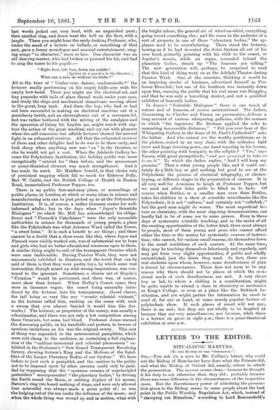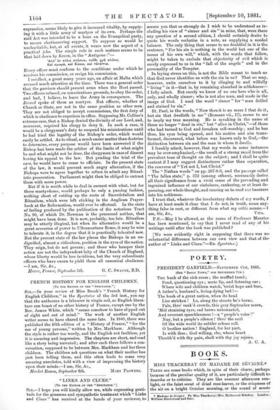LETTERS TO THE EDITOR.
RITUALISTIC MARTYRS.
[TO THE EDITOR OP THE " SPECTATOR."]
SIR,—Yon ask (in a note to Mr. Collins's letter), why could not the Bishop of Manchester have done what the Primate did, and what the Bishop of Oxford did, namely, refuse to admit the prosecution. The answer seems clear,—because he thought it his duty to act otherwise than they did ; probably because there was some difference in the circumstances of the respective cases. But the discretionary power of admitting the prosecu- tion given to the Bishop seems to some people about the best point in the Public Worship Regulation Act, which, instead of " stamping out Ritualism," according to Lord Beaconsfield's
expression, seems likely to give it increased vitality, by supply- ing it with a little army of martyrs of its own. Perhaps the said Act was intended to be a hoax on the Evangelical party, to secure electioneering support. To suppose so would be uncharitable, but, at all events, it wears now the aspect of a practical joke. The simple rule in such matters seems to be that laid down by Kreon, in the " .Antigone :"-
'AAA' Se TALE3sE xpdi taim iv, Kea oiesm pa, Nal aiKaia, Sal niviirria.
Every officer must conform to the conditions under which he receives his commission, or resign his commission.
I recollect, a great many years ago, an affair at Malta which
aroused much attention at the time. There was a general order that the garrison should present arms when the Host passed. Two officers refused, on conscientious grounds, to obey the order, and had, I believe, to leave the Army in consequence. The Record spoke of them as martyrs. But officers, whether of Church or State, are not in the same position as other men. They are not obliged to accept commissions, the first duty of which is obedience to superiors in office. Supposing Mr. Collins's extreme case, that a Bishop denied the divinity of our Lord, and, moreover, required his clergy to deny it. In such a case, it would be a clergyman's duty to suspend his ministrations until he had tried the legality of the Bishop's order, which would easily be settled. As to ritual, a much easier matter than doctrine to determine, every purpose would have been answered if the Bishop had been made the arbiter of the limits of what might be and what might not be done, the clergyman in case of dissent having his appeal to the law. But pending the trial of the case, he would have to cease to officiate. In the present state of the law, it would prevent much angry altercation, if the Bishops were to agree together to refuse to admit any Ritual. istic prosecution. Parliament might then be obliged to entrust them with more power.
But if it is worth while to deal in earnest with what, but for these martyrdoms, would perhaps be only a passing fashion, nothing short of cutting up the roots of Sacerdotalism and Ritualism, which were left sticking in the Anglican Prayer- book at the Reformation, would ever be effectual. In the state of feeling produced by the publication of the notorious Tract No. 90, of which Dr. Newman is the presumed author, that might have been done. It is now, probably, too late. Ritualism may be utterly illogical, but when its alternative would be a great accession of power to Ultramontane Rome, it may be wise to tolerate it, in the degree that it is practically tolerated now. But the present state of the law places the Bishops in an un- dignified, almost a ridiculous, position in the eyes of the nation. They reign, but do not govern ; and those who hamper their action are not the independent laity of the Church of England, whose liberty would be less invidious, but the very subordinate officers who have sworn to yield them all canonical obedience. —I am, Sir, &c.,
Ham; France, September 5th. G. C. SWATICE, B.D.































 Previous page
Previous page